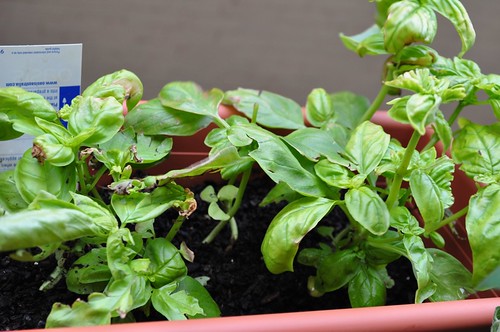 When I potted my tomato plants - the first I've ever grown - I wasn't sure how they'd go on our balcony. We get quite a bit of morning sun but once it hits about 1.30pm/2pm all of our plants are in the shade, so I figured it was going to be a bit hit or miss with the tomatoes, which need full sun. I imagine that making the transition from flower to fruit requires quite a bit of energy and I thought perhaps 4-5 hours of full sun would be enough. Or perhaps it wouldn't. Like I said, I wasn't sure, but I was really keen to start growing some of my favourite foods, so I thought I'd jump right in and start the experiment.
When I potted my tomato plants - the first I've ever grown - I wasn't sure how they'd go on our balcony. We get quite a bit of morning sun but once it hits about 1.30pm/2pm all of our plants are in the shade, so I figured it was going to be a bit hit or miss with the tomatoes, which need full sun. I imagine that making the transition from flower to fruit requires quite a bit of energy and I thought perhaps 4-5 hours of full sun would be enough. Or perhaps it wouldn't. Like I said, I wasn't sure, but I was really keen to start growing some of my favourite foods, so I thought I'd jump right in and start the experiment.Turns out - judging by the photo I took on Sunday - half a day of sun seems to be enough so far. Behold, my first little truss of tomatoes!
I had planned to eat my first serving of home-grown "marties" with a drizzle of olive oil, a pinch of salt and some homegrown basil - which I thought would be a cinch to grow - but alas, I'm not sure the basil is going to make it. It appears to be suffering from blight and wilt, (I have yet to further explore this self-assessed diagnosis) and thus I'm not sure it's going to make it onto the plate. I figure, though, that this is what gardening is about; having a dream (enjoying a meal picked from the balcony garden), taking a risk, celebrating the successes and learning from the challenges.
I'll be researching the care and nurture of basil in my spare moments, but if you have any advice on bringing the little fellas back from the brink, I'm all ears.
 Yellow-ish, caterpillar-ravaged and sorry looking. What to do?
Yellow-ish, caterpillar-ravaged and sorry looking. What to do?



